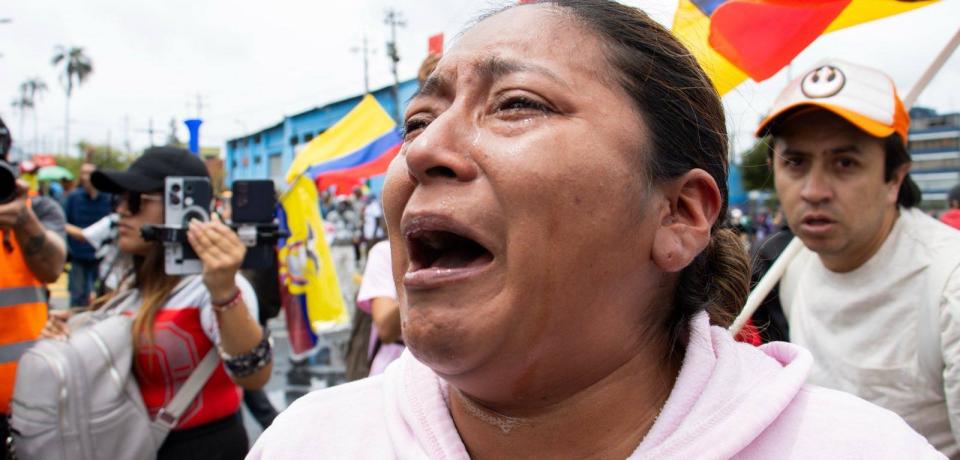
Ecuador is at a crossroads. While stepping up repression against protests [with at least three deaths in recent weeks], Noboa has begun a witch hunt against leaders and activists of social movements.
On the one hand, a new phase of social struggle has begun. Since 23 September, CONAIE (Confederation of Indigenous Nationalities of Ecuador) has been staging protests, which have so far been most intense in the provinces of Imbabura, Pichincha, Cotopaxi and Chimborazo, in response to the increase in diesel prices. But a few days earlier, on 16 September, a mass demonstration of 100,000 people marched through the city of Cuenca in defence of water, whose sources are endangered by environmental licences granted by the government to transnational companies.
A few weeks earlier, on the initiative of the FUT (Unitary Workers' Front), some twenty organisations formed the Front in Defence of Health, Public Education, Decent Work, Social Security, Human Rights and Nature. The FUT and this new Front organised several actions, demonstrations and sit-ins to protest against the anti-democratic Integrity, Security and Intelligence laws (which establish a kind of permanent state of emergency and extend espionage against social organisations and leaders), against a proposed reform of the Social Security law that will open the door for private banks to control parts of the BIESS (the bank of the Ecuadorian Social Security Institute), against the thousands of public sector layoffs (it is estimated that the government will lay off 70,000 workers), and against the crisis that government inaction has caused in public health.
But, on the other hand, the government's response has been persecution, espionage and repression. This is not surprising because, since January 2024, Noboa has been busy setting up and perfecting an authoritarian regime that subordinates and threatens other state functions in order to put them at the service of the president and his group: if at the beginning of his first term he turned against his vice-president, in recent months he has preferred to attack the Constitutional Court. Although the Court gave way to Noboa's referendum and his proposal for a Constituent Assembly, with which he hopes to dismantle all remaining rights, it has not accepted all the provisions of Noboa's anti-democratic laws. The president is taking revenge by accusing the Court of being responsible for the violence of drug trafficking.
The president has been able to advance in the design of his authoritarian regime by hiding behind the ‘internal war’ he declared against ‘terrorism’ and using the population's fear of drug-related violence as a pretext. However, it is now clear that the war was actually being prepared against social protests.
Instead of listening to the voice of the people, Noboa is reinforcing the anti-democratic nature of his regime. As soon as the indigenous protests were announced, the president threatened to ‘denounce them for terrorism’ and send them ‘to prison for 30 years’. With the first demonstrations, Noboa said that ‘these are not protests, they are acts of terrorism’, that it was ‘the same old mafia’ and that the demonstrations were financed by illegal mining and drug cartels.
The demonstrations have been harshly repressed, and the army has even raided homes in indigenous communities to arrest young people. Other people have been arrested without participating in the protests. Among those detained are 12 young indigenous people from Otavalo who were arbitrarily transferred to prisons in Esmeraldas and Portoviejo, where a new massacre took place a few hours earlier, leaving some 30 people dead. By transferring them to these prisons, the government is endangering the lives of these young activists.
It immediately ordered the freezing of the bank accounts of leaders of CONAIE and the Cuenca Water Council. At the same time, it began persecution through the Public Prosecutor's Office. In recent days, the Prosecutor's Office for Organised, Transnational and International Crime has ‘requested information’ from Edwin Bedoya, president of the FUT (Unitary Workers' Front) and CEDOCUT (Ecuadorian Confederation of Classist Organisations for Workers' Unity), Andrés Quishpe, president of the UNE (National Union of Educators), Gary Esparza, president of FENOCIN (National Confederation of Peasant, Indigenous and Black Organisations), and Nery Padilla, president of FEUE (Federation of University Students of Ecuador).
At the same time, the Public Prosecutor's Office is launching an investigation ‘into the alleged crime of unjustified private enrichment’ against 58 activists and leaders of CONAIE, the National Anti-Mining Front and several other social organisations and environmental NGOs linked to social movements.
Marlon Vargas, president of CONAIE, Leonidas Iza, former president of CONAIE, and Guillermo Churuchumbi, coordinator of Pachakutik, were also charged by the Public Prosecutor's Office in the city of Riobamba for organising the strike. At the same time, community media outlets, such as the television station of the Indigenous and Peasant Movement of Cotopaxi (MICC), are being censored.
The mobilisations of recent weeks mark a new moment in the social struggle in Ecuador because they show that a popular opposition is forming against the anti-democratic and neoliberal government of Daniel Noboa. This is already a fact, regardless of the extent and depth of the current protests. At the same time, the struggles are seeking ways to come together and create broader spaces for unity.
Both are seen as a threat by the government and the ruling oligarchies, which is why they are responding with such violence and bad faith. In the face of this, solidarity with the organisations, their leaders and the struggles they are waging is urgently needed.
28/09/2025
Originally published in Correspondencia de Prensa.
Attached is the document Dear Comrades so that social, trade union or political organisations can adapt it in their own way (the formal parts, not the content) and send it to the president of CEDOCUT (Edwin Bedoya) presidenciaced… or even adapt it to send to Ecuadorian consulates or embassies.